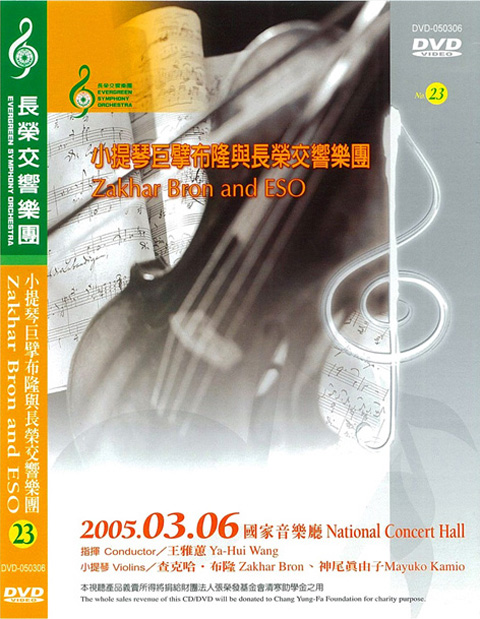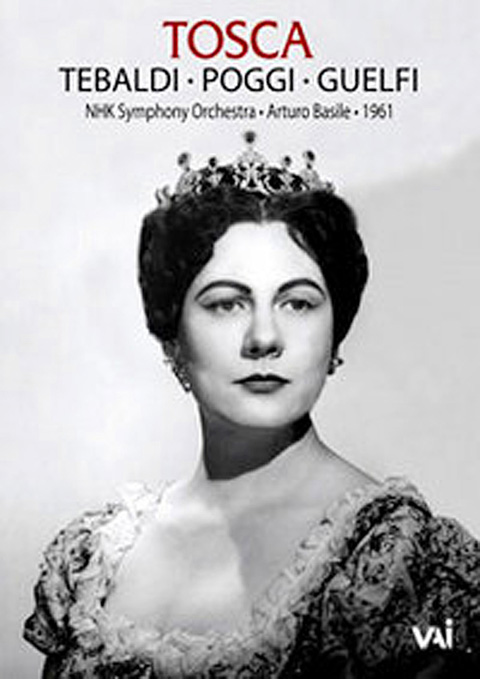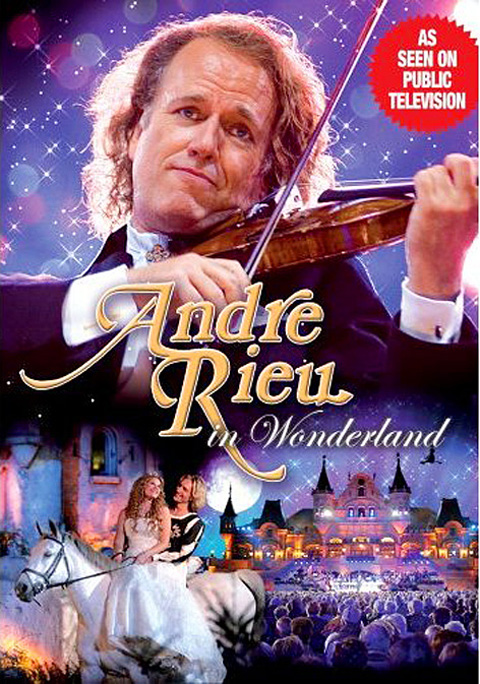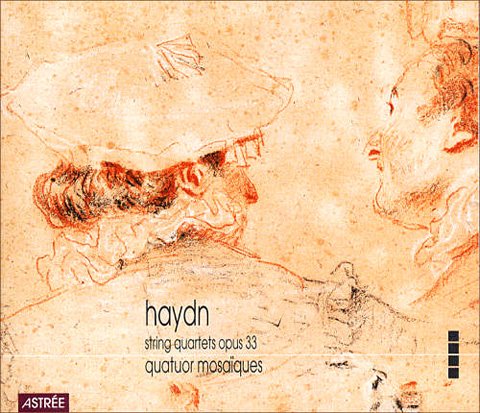It’s less well-known than it should be that Taiwan’s Evergreen Symphony Orchestra [ESO] has a large number of DVDs available containing recordings of their concerts. I’ll review some of them over the next few months, and begin now with one featuring a concert given with, among others, the eminent Russian violinist Zakhar Bron in 2005. Also starring was the Japanese violinist Mayuko Kamio, only 19 at the time. The conductor for the occasion was Taiwan’s Wang Ya-hui (王雅慧) — she was then the orchestra’s music director.
The opening Vivaldi item is predictably light-weight, but the central piece, Bach’s Concerto for Two Violins, is fine indeed. Most surprising for me, though, was the Poeme for violin and orchestra by the reticent French 19th-century composer Ernest Chausson. Beautifully played here by Mayuko Kamio, it’s a hauntingly atmospheric piece. Chausson apparently wrote it after feeling a full-scale violin concerto would be too demanding for his small-scale talent — half way between romantic and impressionist. It was first performed three years before he died after crashing into a brick wall while out riding his bicycle.
These DVDs from ESO have real charm, giving the genuine feeling of a live performance. The full range can be seen on the orchestra’s Web site,

www.orchestra.evergreen.com.tw.
Video Artists International, of Pleasantville, New York, continues to offer rare recordings of famous stars across the whole range of classical music. Watching its black-and-white Tosca, starring Renata Tebaldi (one of the 20th century’s greatest operatic sopranos) in a performance in Tokyo in 1961, is a strange experience.
The production itself is 100 percent traditional. The 39-year-old Tebaldi is wildly applauded on her first appearance on stage, and the Cavaradossi, Gianni Poggi, acknowledges protracted cheering with grateful gestures to the audience just moments before he is due to be executed by firing squad in the stage plot.

Tosca may be as melodramatic as any opera can be, but it has enormous strengths nonetheless. This performance is towered over by a superb Scarpia from baritone Giangiacomo Guelfi. He dominates the close of Act One, and the Te Deum against which he is supposed to snarl his evil designs scarcely makes a showing.
Act Two, at the end of which Tosca murders Scarpia , is superb throughout. This video shows Cavaradossi being tortured in the neighboring room, something that isn’t usually visible to a real-life audience. Meanwhile Scarpia is demanding his night of love with her as the price for his menials removing the spiked iron crown from her lover’s skull.
Puccini’s music isn’t ideally clear by modern recording standards, and the shepherd boy’s song that opens Act Three can hardly be heard at all. Even so, this is a version that collectors of operatic rarities will find hard to resist.

Haydn is known as the “father of the symphony,” but he was also the father of the string quartet. Prior to him, and in his earlier efforts in the form, the first violin played all the tunes and the other three players simply provided an accompaniment. But in the six quartets Opus 33 he made the crucial move of giving all four instruments equal, or almost equal, status, with the leading motifs switching around among them. This breakthrough led to the form becoming the premier vehicle for “intellectual” music for the next 150 years.
Moreover, it was these six quartets that inspired Mozart to labor over six of his own in the new style. They are some of the greatest quartets ever written, and he dedicated them to Haydn. The two men, plus Mozart’s father and another instrumentalist, played some of them together in Mozart’s Vienna apartment, and this was the event that prompted Haydn to tell Mozart’s father that his son was the greatest musical genius known to him, dead or alive.
There are many recordings of Haydn’s quartets, but the ones on period instruments by the French Quatuor Mosaiques (Mosaiques Quartet) are something special. Period instrument playing, which came into fashion in the 1970s, was initially beset with problems, but the Mosaiques are credited with having ironed these out and produced versions that are simultaneously characterful and seamless. They have to compete with the excellent bargain-priced versions from the Kodaly Quartet on Naxos, as well as the impassioned ones from the Lindsays, but this pair of CDs can nevertheless be recommended to all listeners who appreciate impeccability and poise.

Andre Rieu’s latest extravaganza, Andre Rieu in Wonderland, is both predictable and astonishing. The live concert, containing popular classical items served up along with horses, a camel and an elephant, plus Some Day My Prince Will Come and Somewhere Over the Rainbow, is a happy-happy carnival of enormous color and brio. Rieu’s events are basically parties and, though purists are sure to disapprove, they really can’t harm anyone. They give great pleasure, as well as helping banish the popular conception of the classics as being drab (Rieu’s underlying purpose). This one took place in Holland’s Efteling amusement park and centers on enchanted castles and delicious princesses. Clearly an almost-fantastic time was had by almost everyone.

On April 26, The Lancet published a letter from two doctors at Taichung-based China Medical University Hospital (CMUH) warning that “Taiwan’s Health Care System is on the Brink of Collapse.” The authors said that “Years of policy inaction and mismanagement of resources have led to the National Health Insurance system operating under unsustainable conditions.” The pushback was immediate. Errors in the paper were quickly identified and publicized, to discredit the authors (the hospital apologized). CNA reported that CMUH said the letter described Taiwan in 2021 as having 62 nurses per 10,000 people, when the correct number was 78 nurses per 10,000

As we live longer, our risk of cognitive impairment is increasing. How can we delay the onset of symptoms? Do we have to give up every indulgence or can small changes make a difference? We asked neurologists for tips on how to keep our brains healthy for life. TAKE CARE OF YOUR HEALTH “All of the sensible things that apply to bodily health apply to brain health,” says Suzanne O’Sullivan, a consultant in neurology at the National Hospital for Neurology and Neurosurgery in London, and the author of The Age of Diagnosis. “When you’re 20, you can get away with absolute

May 5 to May 11 What started out as friction between Taiwanese students at Taichung First High School and a Japanese head cook escalated dramatically over the first two weeks of May 1927. It began on April 30 when the cook’s wife knew that lotus starch used in that night’s dinner had rat feces in it, but failed to inform staff until the meal was already prepared. The students believed that her silence was intentional, and filed a complaint. The school’s Japanese administrators sided with the cook’s family, dismissing the students as troublemakers and clamping down on their freedoms — with

As Donald Trump’s executive order in March led to the shuttering of Voice of America (VOA) — the global broadcaster whose roots date back to the fight against Nazi propaganda — he quickly attracted support from figures not used to aligning themselves with any US administration. Trump had ordered the US Agency for Global Media, the federal agency that funds VOA and other groups promoting independent journalism overseas, to be “eliminated to the maximum extent consistent with applicable law.” The decision suddenly halted programming in 49 languages to more than 425 million people. In Moscow, Margarita Simonyan, the hardline editor-in-chief of the